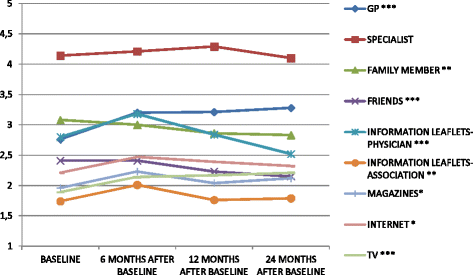A longitudinal study on the information needs and preferences of patients after an acute coronary syndrome
- PMID: 27646507
- PMCID: PMC5028970
- DOI: 10.1186/s12875-016-0534-8
A longitudinal study on the information needs and preferences of patients after an acute coronary syndrome
Abstract
Background: Research has shown that the provision of pertinent health information to patients with cardiovascular disease is associated with better adherence to medical prescriptions, behavioral changes, and enhanced perception of control over the disease. Yet there is no clear knowledge on how to improve information pertinence. Identifying and meeting the information needs of patients and their preferences for sources of information is pivotal to developing patient-led services. This prospective, observational study was aimed at exploring the information needs and perceived relevance of different information sources for patients during the twenty-four months following an acute coronary syndrome.
Methods: Two hundred and seventeen newly diagnosed patients with acute coronary syndrome were enrolled in the study. The patients were primarily men (83.41 %) with a mean age of 57.28 years (range 35-75; SD = 7.98). Patients' needs for information and the perceived relevance of information sources were evaluated between 2 and 8 weeks after hospitalization (baseline) and during three follow-ups at 6, 12 and 24 months after baseline. Repeated measures ANOVA, Bonferroni post hoc tests and Cochran's Q Test were performed to test differences in variables of interest over time.
Results: Results showed a reduction in information needs, but this decrease was significant only for topics related to daily activities, behavioral habits, risk and complication. At baseline, the primary sources of information were specialists and general practitioners, followed by family members and information leaflets given by physicians. Relevance of other sources changed differently over time.
Conclusion: The present longitudinal study is an original contribution to the investigation of changes in information needs and preferences for sources of information among patients who are diagnosed with acute coronary syndrome. One of the main results of this study is that information on self-disease management is perceived as a minor theme for patients even two years after the event. Knowledge on how patients' information needs and perceived relevance of information sources change over time could enhance the quality of chronic disease management, leading health-care systems to move toward more patient-tailored care.
Keywords: Acute coronary syndrome; Cardiovascular disease; Health information sources; Information needs; Longitudinal research.
Figures
References
-
- Carlsson AC, Wändell PE, Gigante B, Leander K, Hellenius M, de Faire U. Seven modifiable lifestyle factors predict reduced risk for ischemic cardiovascular disease and all-cause mortality regardless of body mass index: A cohort study. Int J Cardiol. 2013;168(2):946–952. doi: 10.1016/j.ijcard.2012.10.045. - DOI - PubMed
-
- Folsom AR, Yatsuya H, Nettleton JA, Lutsey PL, Cushman M, Rosamond WD. Community prevalence of ideal cardiovascular health, by the american heart association definition, and relationship with cardiovascular disease incidence. J Am Coll Cardiol. 2011;57(16):1690–1696. doi: 10.1016/j.jacc.2010.11.041. - DOI - PMC - PubMed
Publication types
MeSH terms
LinkOut - more resources
Full Text Sources
Other Literature Sources


